|
The world has lost a great woman
Tribute: Coretta
Scott King
by Marsha Prescod
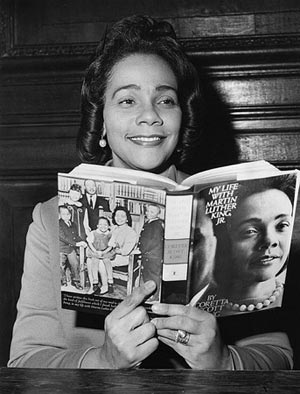 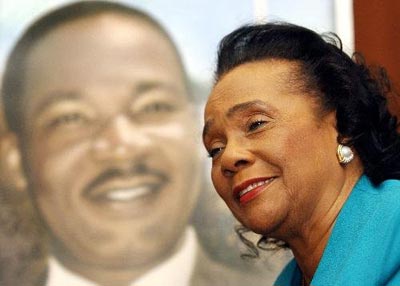
Coretta Scott King, 1927 - 30th January 2006, widow
of the legendary civil rights activist and Nobel
Peace Prize Winner Martin Luther King Jr, has died
after a full and distinguished campaigning life of
her own, a famed human rights activist.
Born in the southern part of the US to Obadiah and
Bernice Scott, she knew what it was like to have
to work on the family land as a child, to live under
the shadow of racial violence from white neighbours,
and to live under a legal regime that enforced segregation.
An intelligent and ambitious child she graduated
at the top of her class in 1945 and won a scholarship
to Antioch College in Ohio studying music and elementary
education. Whilst there, she performed with an internationally
famous artist and civil rights activist Paul Robeson,
which must have had a considerable impact upon her
in view of her later life. From Antioch she got another
scholarship, to the New England Conservatory in Boston
where she met the young Martin Luther King Jr, -his
father a leading black minister in Georgia- who was
doing a PhD in theology at Boston University. They
married in 1953, and the turmoil over race brewing
in the South meant that they would plunge into a
high profile, death-defying life of political and
social change that was to inspire civil and human
rights movements around the world, but demand the
ultimate sacrifice from them and their family.
Background: A historical political and social struggle
In an understandable attempt to re-write history
that comes with the shame of being exposed as a society
in gross violation of the human rights of their black
citizens, US commentators have a natural inclination
to play down the viciousness of the apartheid-like
system in the southern states of the US, that had
existed since the abolition of slavery and which
haunted the lives of black people in the 1950s. Segregated
housing and schooling, shopping, hotels, churches,
restaurants etc, restricted employment, arbitrary
treatment under the judicial system, the lack of
protection from violence from white southerners- up
to and including murder- the denial of the right
to vote were part of the former confederate States ‘southern
way of life’. The physical violence peaceful
marchers and protesters were subject to, the jailings,
the threats, the bombings and the collusion (and
at times involvement) of local police forces and
judicial systems were all exposed under the stunned
gaze of international media due to the brilliant
Gandhi-influenced campaign of the southern Civil
Rights Movement.
Dr Martin Luther King Jr, educated scion of the black
middle class, possessing the oratorical gifts of
a black priesthood well known to the African- American
community but revelatory to the wider white community,
was a natural focal point. Poised, calm, photogenic,
with engrained southern courtesy, the young cleric
was the poster boy for mass actions that had revolutionary
directions at times even as it appealed to conservative
factions in the African-American community, and liberal
white northerners, with its heavy referencing of
Biblical stories and exhortations. As a trained theologian,
his intellectual reasoning brought on board prominent
white protestant ministers, his moral stance and
alliances brought in veterans of the socialist movement
in the Northern US and Jewish people remembering
the programs of Eastern Europe. These varied allies
contributed financially and directly to the fight
for justice and equality.
A family forged in the fire of destiny
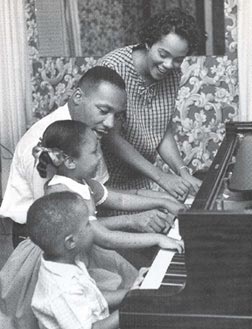 The Kings were only in their twenties when a catalyst
in the form of the Rosa Parks refusal to sit in
the coloured section of the Montgomery bus galvanized
Dr King, pastor of the Dexter Avenue Baptist Church,
and president of the Montgomery Improvement Association,
into action, together with other members of the
local chapter of the NAACP and other black community
organizations. It was 1955 and a mere two weeks
after Coretta Scott King had given birth to her
first child, but Rosa Park’s arrest was the
catalyst for the launching of a mass boycott of
the Montgomery bus system. Life became a complex
combination of family life as a wife and mother,
and dealing with the effects of political activity-
marches, demonstrations, meetings, rallies, fundraising
events, court hearings, press conferences. Even
if her husband was the main activist in the family,
she was necessarily drawn in. She had to deal with
him being a figurehead in a campaign of mass civil
disobedience that resulted in him being thrown
in jail. She used her musical training to perform
as a vocalist and raise money at freedom concerts,
traveling around the southern states. The Kings were only in their twenties when a catalyst
in the form of the Rosa Parks refusal to sit in
the coloured section of the Montgomery bus galvanized
Dr King, pastor of the Dexter Avenue Baptist Church,
and president of the Montgomery Improvement Association,
into action, together with other members of the
local chapter of the NAACP and other black community
organizations. It was 1955 and a mere two weeks
after Coretta Scott King had given birth to her
first child, but Rosa Park’s arrest was the
catalyst for the launching of a mass boycott of
the Montgomery bus system. Life became a complex
combination of family life as a wife and mother,
and dealing with the effects of political activity-
marches, demonstrations, meetings, rallies, fundraising
events, court hearings, press conferences. Even
if her husband was the main activist in the family,
she was necessarily drawn in. She had to deal with
him being a figurehead in a campaign of mass civil
disobedience that resulted in him being thrown
in jail. She used her musical training to perform
as a vocalist and raise money at freedom concerts,
traveling around the southern states.
In 1956 she and her daughter escaped death when
a bomb exploded at the family home whilst her husband
was out preaching. The reluctance of the federal
government to act to protect US citizens trying to
exercise their legal rights,meant those involved
in the non-violent actions of civil disobedience-
sit-ins at segregated facilities, at mainstream places
like Woolworths, and public libraries, attempts to
register to vote, ‘freedom rides’ on
buses, trying to attend all white schools- faced
rampant violence from the police, the national guard
in a number of the southern states. The Ku Klux Klan
and similar white terrorist organisations in the
South ran unchecked backed by notorious city mayors
and state governors such as George Wallace. Assassinations
of members of the movement such as the charismatic
Medgar Evers in Mississipi in 1963 were and bombing
black churches were another way of intimidating those
who wanted change. The apalling image of the US around
the world caused by scenes of police setting dogs
and firehoses on youthful peace marchers- some of
whom were school children- eventually led to reluctant
action by the federal government under President
John F Kennedy and his brother Robert, the attorney
general.
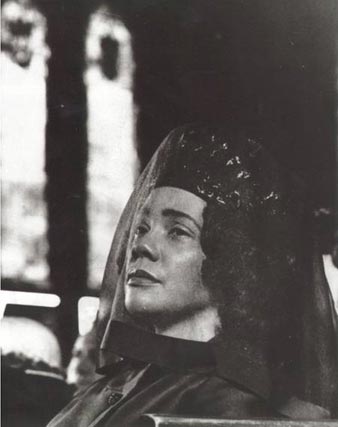 The civil rights movement gathered momentum and
activities continued for the next decade even as
their family expanded as more children arrived. Though
it was Dr King who did most of the traveling and
was often away from home, they both traveled to India
in 1959 to meet King’s inspiration for non-violent
political change, Mahatma Gandhi. Coretta attended
the 17-nation Disarmament Conference in Geneva, Switzerland
as a Women's Strike for Peace delegate in 1962. She
accompanied her husband to Oslo in 1964 to accept
his Nobel Peace Prize- a nomination which had caused
outrage in the US establishment at the time. Well
before Dr King spoke out publicly against the Vietnam
War, Coretta spoke at an anti-Vietnam War rally in
1965 at Madison Square Garden. The civil rights movement gathered momentum and
activities continued for the next decade even as
their family expanded as more children arrived. Though
it was Dr King who did most of the traveling and
was often away from home, they both traveled to India
in 1959 to meet King’s inspiration for non-violent
political change, Mahatma Gandhi. Coretta attended
the 17-nation Disarmament Conference in Geneva, Switzerland
as a Women's Strike for Peace delegate in 1962. She
accompanied her husband to Oslo in 1964 to accept
his Nobel Peace Prize- a nomination which had caused
outrage in the US establishment at the time. Well
before Dr King spoke out publicly against the Vietnam
War, Coretta spoke at an anti-Vietnam War rally in
1965 at Madison Square Garden.
A leader in her own right: and not afraid of controversial
causes
When Dr King finally, inevitably became a victim
of the assassin’s bullet in 1968, Coretta Scott
King did not retire to the sidelines to raise her
four children. She continued to develop as a political
activist in her own right. Two months after his death,
she made a speech on Solidarity Day calling for a
solid block of women power to fight racism, poverty
and war. Within a year she founded the Martin Luther
King Centre for Non-Violent Social Change. She was
its president and CEO. For twenty years she campaigned
for her husband’s birthday to become a national
holiday in the USA - which it eventually did in 1986.
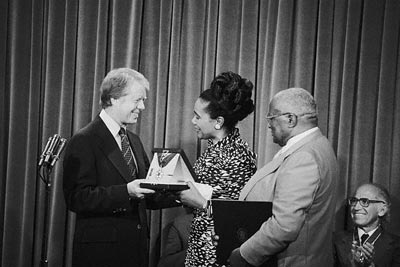 Coretta Scott King’s political focus moved
with the times. She did not restrict her activism
to ‘safe’ mainstream areas. In the 1970s
she formed a coalition of more than 100 women’s
organisations, labour, business and church organisations
to campaign for full employment. In the 1980s, she
was arrested during an anti-apartheid demonstration
outside the South African Embassy in Washington with
three of her children. During that decade she travelled
to Southern Africa to support the struggle against
apartheid, met Winne Mandela in South Africa, refused
to meet the president of that country and urged America
to impose sanctions. Coretta Scott King’s political focus moved
with the times. She did not restrict her activism
to ‘safe’ mainstream areas. In the 1970s
she formed a coalition of more than 100 women’s
organisations, labour, business and church organisations
to campaign for full employment. In the 1980s, she
was arrested during an anti-apartheid demonstration
outside the South African Embassy in Washington with
three of her children. During that decade she travelled
to Southern Africa to support the struggle against
apartheid, met Winne Mandela in South Africa, refused
to meet the president of that country and urged America
to impose sanctions.
She clashed with the more conservative elements within
her community, including her own daughter and neice
when she became a supporter of lesbian and gay rights
in the 90s, and later same sex marriages. She spoke
out against capital punishment, (particulary in the
case of juveniles) despite it being popular with
the majority of her countrymen. She was against the
US invasion of Iraq in 2003 at a time when very few
prominent public figures dared to speak out against
it.
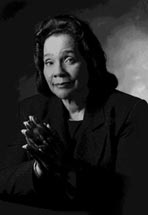 Her death following a stroke and heart attack, resulted
in tributes pouring in from around the world. Her
body lay in state at the Georgia state capital,both
the US Senate and House of Representatives passed
special resolutions honouring her. Four US presidents
(three former ones and the current serving president)
attended her funeral. Her death following a stroke and heart attack, resulted
in tributes pouring in from around the world. Her
body lay in state at the Georgia state capital,both
the US Senate and House of Representatives passed
special resolutions honouring her. Four US presidents
(three former ones and the current serving president)
attended her funeral.
Her legacy is the Martin Luther King Centre for Non-Violent
Social Change, still going, an international organisation
focuses on the following areas:
-
The development and dissemination of programs that
educate the world about Dr. King’s philosophy
and methods of nonviolence, human relations,
service to mankind, and related ideas;
- Building a national and international network
of organisations that, through sanctioned programs,
promote, compliment, and help further the organisation’s
mission and objectives of building the Beloved
Community that Dr. King envisioned
- Functioning as the clearinghouse for non-profit
organisations and government agencies which
utilise Dr. King’s
image and writings for programs and ensuring
that the programs are historically and interpretively
accurate;
- Monitoring and reporting on the impact of Dr.
King’s
legacy on the world.
The world has lost a great woman.
"I am convinced that if I had not had a
wife with the fortitude, strength and calmness
of Coretta, I could not have stood up amid the ordeals
and tensions surrounding the
Montgomery movement. I came to see the real meaning
of that rather trite statement:
'A wife can either make or break a husband.' Coretta
proved to be that type of wife
with qualities to make a husband when he could have
been so easily broken. In the
darkest moments she always brought the light of hope." -
Rev. Dr. Martin Luther King, Jr.
The pictures used in this article were sent
to us. If we have infringed anyone's copyright,
please let us know and we will either credit them
or remove them. Thanks.
|




